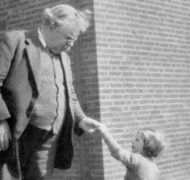Love Humanity by Loving Your Neighbor
Blog / Produced by The High Calling
You may have large calling to a wider world, but we ALL have a local calling to the small world in which God has placed us. We may strive and work to love humanity, but if we can’t love our neighbors, it will come to nothing.In a recent post, Sam Van Eman quotes G.K. Chesterton and wonders about the power of the call to love our neighbors. Chesterton says,
"We may fight for the cause of international peace because we are very fond of fighting…But we have to love our neighbour because he is there--a much more alarming reason for a much more serious operation…The best way that a man could test his readiness to encounter the common variety of mankind would be to climb down a chimney into any house at random, and get on as well as possible with the people inside. And that is essentially what each one of us did on the day that he was born."
The question Sam is dealing with is a big one, but not one that people talk about very often. In life we will always be faced with choices about where we invest our time and energy. Will you be a person who is mostly concerned with macro issues and large groups of people? Or will you be a person who is mostly involved with local and individual concerns? You can do both, of course, but in life there is always a necessary choosing. God has given us a limited number of years, and we can’t do everything.
I tend to be a little suspicious when I hear someone refer to large, vague categories of people. We often speak of “the poor” and “the rich,” as though those groups had unionized and were meeting regularly to decide policy and organize action committees. “If only the rich would be more generous,” one person bemoans, while another says, “If only the poor would take advantage of their opportunities.” I’ve got news for you. The rich and the poor will never act in one accord because there are no such groups. There are only people. Some are rich, some are poor, most are in between, and all of them are individuals. And in the end, I believe that loving individual people is our first and highest calling.
I certainly don’t want to discount the wonderful work of people who are involved with big causes. The world would be a worse place if there were no activists who worked for large groups of people. Yes, those causes are worthy of our time. However, as Christians we can never forget that Christ called us first to love our neighbor as ourselves. The social action Jesus called for in the Sermon on the Mount was directed toward individuals who wandered (or were sent by God) into the local sphere of a citizen of the Kingdom of Heaven. Thus a person with no coat receives one because he passed by a follower of Christ who had two.
In his piece, Sam wrote of the snow globes in which we live, the small spheres of our worlds that contain our neighbors and friends. He wonders if we might be called by Christ to something local.
I think we are.
Some people are called almost exclusively to local action. There are parents whose whole lives revolve around the care of one disabled child. They have no time, money, or energy for anything beyond this. They may rarely serve Christ outside of their own homes, but they are being faithful to their highest calling.
Other people are indeed called to work with vast movements and on behalf of large groups of people. But that work does not replace their first and primary calling to the people around them. Righteous activism must be born out of righteous relationships. If it isn’t, it often turns ugly. There are people who claim to love humanity but are indifferent to humans they meet on the street. There are child care workers who neglect their own children. And there are those who say they love Christ but somehow miss the presence of Christ in the people next door.
You may have a large calling to a wider world, but we ALL have a calling to the small world in which God has placed us. We may strive and work to love humanity, but if we can’t love our neighbors, it will come to nothing.
Gordon Atkinson





